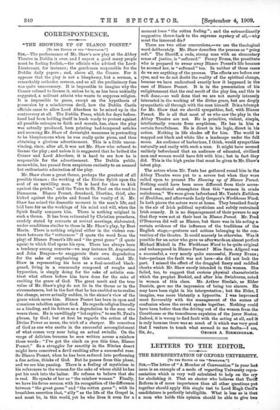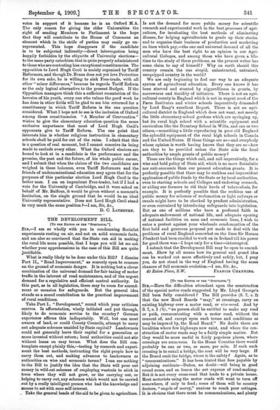LETTERS TO THE EDITOR.
THE REPRESENTATION OF OXFORD UNIVERSITY.
[To TRY EDITOR OF TER "Srzyn.Tos."1 SIR,—The letter of "A Member of Convoeation " in your last issue is an example of a mode of regarding University repre- sentation which is very well calculated to help on the cry for abolishing it. That an elector who believes that Tariff Reform is of more importance than all other questions put together should apply this single test to Lord Hugh Cecil's candidature is perfectly intelligible. What is less so is that a man who holds this opinion should be able to give two
votes in support of it because he is an Oxford M.A. The only reason for giving the older Universities the right of sending Members to Parliament is the hope that they will contribute to the House of Commons an element which in the strife of parties may easily go un- represented. This hope disappears if the candidate is to be subjected indirectly—direct interrogation being happily forbidden by the etiquette of University elections— to the same party catechism that is quite properly administered to those who are contesting less exceptional constituencies. The opposition to Lord Hugh Cecil is mainly organised by Tariff Reformers, and though Dr. Evans does not yet love Protection for its own sake, he is willing to sink Free-trade, with all other "minor differences," because he regards Tariff Reform as the only logical alternative to the present Budget. If the Opposition managers think this a sufficient recantation of the heresies of his youth, every one who values the good work he has done in other fields will be glad to see him returned for a constituency in which Tariff Reform is the one question considered. What I hope not to see is the inclusion of Oxford among those constituencies. "A Member of Convocation" wishes to give the elementary education question the same exclusive importance that most of Lord Hugh Cecil's opponents give to Tariff Reform. The one point that interests him is whether religious instruction in elementary schools shall be paid for out of the rates. I admit that this is a question of real moment, but I cannot conceive its being made to exclude every other. What the Oxford electors are bound to look at in a candidate is the performance and the promise, the past and the future, of his whole public career, and I submit that when the claims of the two candidates are weighed in these balances, even Tariff Reformers and the friends of undenominational education may agree that for the purposes of this particular election Lord Hugh Cecil is the better man. I am an impenitent Free-trader, but if I had a vote for the University of Cambridge, and it were asked on behalf of Mr. Balfour, it would be given without a moment's hesitation, on the single ground that he would be an ideal University representative. Does not Lord Hugh Cecil stand in very much the same position ?—I am, Sir, &c.,
D. C. LATUBURY.







































 Previous page
Previous page